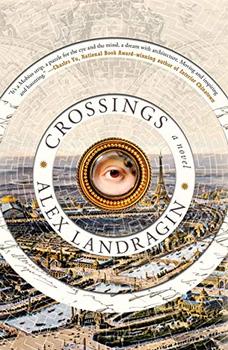Summary | Excerpt | Reading Guide | Reviews | Beyond the book | Read-Alikes | Genres & Themes | Author Bio

It is easy to see why Martin Seay's debut novel, The Mirror Thief, has been compared to David Mitchell's Cloud Atlas, and comparisons to Elmore Leonard and Umberto Eco are also justified for this substantial and richly imagined novel, spanning three time periods and two continents.
In the opening contemporary storyline, Curtis Stone, a wounded war veteran, cannot return to his post as a military policeman after years of active duty in Kosovo, the Gulf and Guantanamo Bay. He receives disability payments and is encouraged by his wife to re-train, but, unsure of his future direction, Curtis agrees to do a job for an ex-service colleague Damon, now security manager for an Atlantic City casino. Damon wants Curtis to track down Stanley Glass, a gambler who also happens to be a friend of Curtis' father. Curtis has little to go on, but is armed with Stanley's copy of The Mirror Thief, a strange little book of poems that describes the world of Vittor Crivano, a sixteenth century doctor in Venice involved in the worlds of alchemy and magic. Curtis heads to New Orleans where Stanley is rumored to be, but unfortunately, he is not easy to locate.
Instead, the elusive Stanley takes center stage in a different narrative strand as Seay transports readers to 1950s Los Angeles. Then, Stanley is only sixteen but lives on the streets, surviving as a petty thief, and conman. He has travelled with another young grafter, Claudio, all the way from Brooklyn to L.A. in order to track down Adrian Welles, the author of The Mirror Thief, his favorite book. Stanley hopes that Adrian Welles can help him understand and perhaps even visit the magical world that the book describes, but just when he finds Welles, Stanley's life is complicated by clashes with local gangs and drug dealers.
The third time period in the novel moves even further into the past and across the Atlantic to sixteenth century Venice and centers on Vittor Crivano, the central character in The Mirror Thief, who, according to Welles, was a real historical figure. In Venice, Crivano has been engaged to secretly entice two craftsmen to leave the city and set up as glass and mirror makers in another country. Under Venetian rule, this is a criminal enterprise (see 'Beyond the Book') and Crivano's mission is further complicated when he is distracted by a young novitiate nun. Rich with the sounds, smells and language of the sixteenth century, Crivano's adventures may superficially appear vastly different than the other two narratives, but connections of character, event and even location tie them together.
All three narratives have dark themes and scenes of a violent and or sexual nature, which may not appeal to all readers. The story is complex and at times hard to parse. At one point Crivano reflects that however he "tries to conceive the plot, it refuses to hold a shape and remains formless as a gob of spit," and some readers may feel this equally applies to their reading experience. For those happy to enjoy the ride, however, there is much to enjoy here: a twisting mystery, rich language, metaphysical discourse and allusions and references to medieval texts, philosophy and poetry galore. Seay is clearly a talented and knowledgeable writer who has written a transporting and original novel.
![]() This review was originally published in The BookBrowse Review in May 2016, and has been updated for the
April 2017 edition.
Click here to go to this issue.
This review was originally published in The BookBrowse Review in May 2016, and has been updated for the
April 2017 edition.
Click here to go to this issue.

If you liked The Mirror Thief, try these:

by Leigh Bardugo
Published 2024
From the #1 New York Times bestselling author Leigh Bardugo comes a spellbinding novel set in the Spanish Golden Age.

by Alex Landragin
Published 2021
Alex Landragin's Crossings is an unforgettable and explosive genre-bending debut--a novel in three parts, designed to be read in two different directions, spanning a hundred and fifty years and seven lifetimes.




We should have a great fewer disputes in the world if words were taken for what they are
Click Here to find out who said this, as well as discovering other famous literary quotes!
Your guide toexceptional books
BookBrowse seeks out and recommends the best in contemporary fiction and nonfiction—books that not only engage and entertain but also deepen our understanding of ourselves and the world around us.